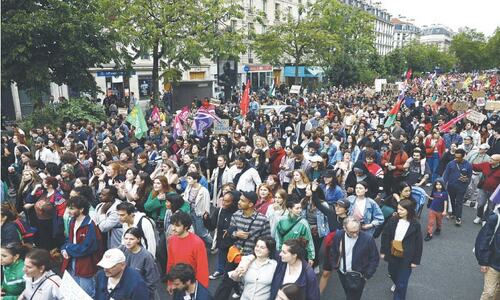KATHMANDU, April 30: Nepal’s King Gyanendra lifted on Saturday a state of emergency he clamped on the Himalayan kingdom when he grabbed power three months ago after coming under heavy world pressure to restore democracy. The proclamation was broadcast on state radio a day after the king returned from a nine-day trip abroad.
“His Majesty the King has withdrawn the state of emergency,” state radio announced, saying he had taken the step in accordance with the constitution.
But the king left in place a powerful anti-corruption commission he formed after seizing power that has sweeping arrest and punishment rights. King Gyanendra sacked the government led by Sher Bahadur Deuba on Feb 1, assumed power and declared emergency rule, saying the government had failed to crush a Maoist uprising that has claimed over 11,000 lives.
There was confusion about what impact the end to emergency rule would have in the tiny kingdom sandwiched between India and China as the king kept the extraordinary powers he awarded himself in February. Hours after the end to emergency rule, state radio announced Kathmandu’s district administration office had banned “the holding of protests, strikes, mass meetings and hunger strikes in sensitive areas in the Nepalese capital”.
State radio announced no timeframe for a lifting of the ban, which it said was intended “to maintain law and order”. Areas affected by the ban included the sprawling royal palace in the ancient capital’s heart.
“Fundamental rights ... have not been restored,” said Sahana Pradhan, a senior leader of the Nepal Communist Party-United Marxist Leninist, one of the parties in the dismissed coalition government. The lifting of the emergency “has no meaning because opposition leaders are still under detention”, she added.
The king’s power grab drew condemnation from the international community, with India and Britain suspending desperately-needed military aid to Nepal’s ill-equipped army battling the nine-year-old insurgency.
India, Nepal’s biggest military donor, welcomed the lifting of the emergency as a first step “towards the beginning of a political process in that country”. But it urged the king to release all political leaders in custody and restore civil liberties to open the way “ reconciliation” between the monarchy and political parties. The statement was silent on resumption of military aid.
An Amnesty International report said last week 3,000 people were detained after the king seized power, based on reports by local human rights groups, and 1,000 remained in detention.
Last week, the king’s anti-corruption commission ordered the arrest of former premier Deuba after he refused to answer corruption allegations involving the awarding of contracts.
Mr Deuba accused the Royal Commission for Corruption Control of pursuing a vendetta against opponents of Gyanendra’s takeover. The commission has also arrested a former works minister for refusing to answer questions.
“The news of lifting the state of emergency ... is a welcome step,” Gopal Man Shrestha, a senior leader of the Nepali Congress (Democratic) party, said.
“But the continuation (of the commission) ... is absurd as it is merely to terrify or frighten politicians or businessmen,” he said.
Critics say the commission acts on flimsy evidence supplied by anonymous sources and is used by the king as a tool to intimidate opponents.
“The commission is (now) King Gyanendra’s political weapon to terrify the political opposition and general public,” Shrestha said.
The king’s move came after he attended the Asian-African summit last week in Jakarta, where he met Indian Prime Minister Manmohan Singh and UN Secretary General Kofi Annan, who both pressed him to restore democratic rule.
On his return on Friday, King Gyanendra said he “told world leaders Nepal gave priority to fighting against terrorism in the country ... and to the establishment of peace in the country”.
Emergency rule was due to expire on May 1, three months after being imposed.
Pradip Giri, a leader of the Nepali Congress who went to New Delhi after the king seized power, called King Gyanendra’s move a sham.
“He’s trying to convince the international community he still abides by the constitution,” he told India’s NDTV news. “He had no right to murder the constitution and arrest the prime minister of the country.” —Reuters











































Dear visitor, the comments section is undergoing an overhaul and will return soon.